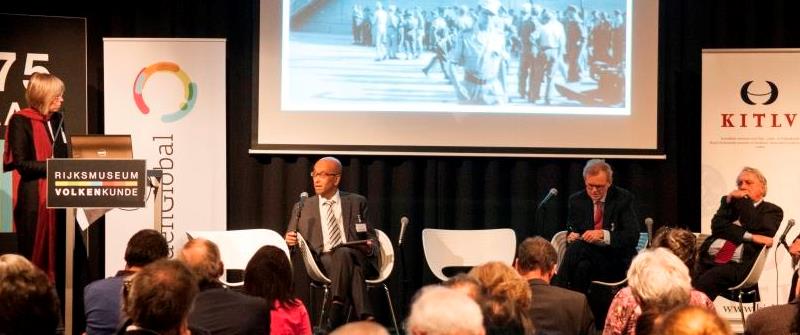
22 Dec The Indonesian war of decolonization and its afterlife
On the afternoon of 10 December, the KITLV organized a symposium in Leiden on the Indonesian war of decolonization (1945-1949) and its afterlife in Indonesia and the Netherlands. The continuing presence of this war in Dutch public conscience showed from the speed with which the attendance list of 150 had filled up, as well as the presence of several representatives of the Dutch press. The afternoon opened with lectures in which the Dutch-Indonesian conflict was placed in a wider context by three eminent researchers. The second part of the afternoon was dedicated to a debate between researchers and politicians about the question why Dutch society is still struggling to come to terms with this war, the largest military conflict it ever fought.
A keynote lecture was delivered by Prof. Christian Gerlach (Bern University) on ‘Famine and insurgency around 1945: the cases of Indonesia, Indochina and Greece’. Gerlach showed that military conflicts like that in Indonesia, but also the wars in Indochina and Greece that happened in the same period, cannot be seen as separate from larger conflicts and crises that happened at the same time. Throughout the world in the 1940s, many societies experienced large-scale famines that deeply influenced their social and political constellations. The next lecture was delivered by Remco Raben (Utrecht University), who spoke about ‘Descent into violence: the one or the many? Connecting Indonesian and Dutch murderousness in Indonesia’s revolution’. Raben reflected on the connections between Dutch and Indonesian violence, explaining that it is impossible to study and explain Dutch military violence without taking into account its relations to concurrent Indonesian violence – and vice versa. Finally, Abdul Wahid (Universitas Gadjah Mada, Yogyakarta Indonesia) spoke about ‘Coming to terms with a “violent and emotional past”: Indonesian perspectives on the decolonization war’. Wahid described how Indonesian historians have interpreted the ‘Indonesian revolution’, explaining how the Indonesian historical self-image has long been closely intertwined with its political realities. Only in recent years have more alternative historical narratives come to the fore. Wahid closed by sketching some future challenges for Indonesian historians in understanding and writing their own past.
The second part of the afternoon was dedicated to a debate, introduced by Gert Oostindie (director KITLV) and moderated by Marjan Schwegman (director NIOD), about the political sensitivity of speaking about Dutch military operations, which has maintained until the present day. Participating in the debate were Nikolaos van Dam (former Dutch ambassador to Indonesia), Cees Fasseur (prof. em. and co-author of the Excessennota), Piet Kamphuis (director NIMH) and Wim Manuhutu (owner of MANU2U and former director of the Moluccan Historical Museum). The debate was lively, but all participants agreed that more research into this war and into Dutch military violence is long overdue. Fasseur advocated a less apologetic use of words, explaining that the term ‘excesses’, current in Dutch parlance, is a way of speaking euphemistically about war crimes. Manuhutu emphasized that it is important to realize that for many KNIL-soldiers, the war was much closer to a vicious civil war than a clear symmetrical war. Kamphuis explained that further research into this war can also help in the training of officers and soldiers for future wars, because it helps explain how violence comes into being. Van Dam called for focusing not only on academic research, but also more extensively on making sure that the knowledge about Indonesian decolonization is taught in schools and finds its way to a wider public.
The symposium was followed on 11 and 12 December by a small-scale workshop at the KITLV on ‘Decolonization and the origins of “excessive” violence’, where various international experts discussed further about challenges and opportunities for future (comparative) research into wars of decolonization.




No Comments